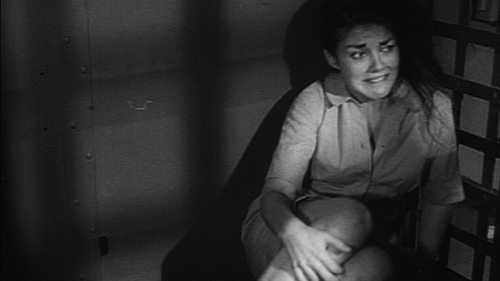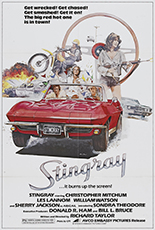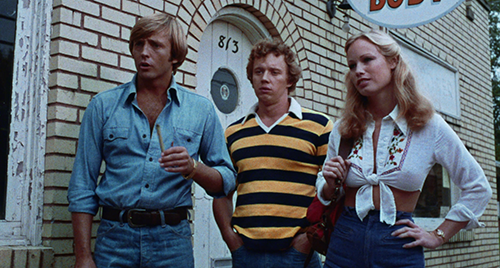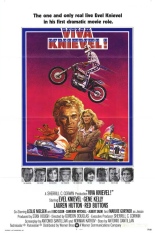
 Not for nothing does the tagline to this Stephen C. Apostolof sexploitation film shout, “SEXUALLY HANDICAPPED BY ORDER OF THE COURT.” His favorite sexploitation starlet, the magnificent Marsha Jordan, stars as the (ahem) titular The Divorcee. Yes, that’s Divorcee with double Es, appropriately.
Not for nothing does the tagline to this Stephen C. Apostolof sexploitation film shout, “SEXUALLY HANDICAPPED BY ORDER OF THE COURT.” His favorite sexploitation starlet, the magnificent Marsha Jordan, stars as the (ahem) titular The Divorcee. Yes, that’s Divorcee with double Es, appropriately.
Jordan’s Betty Brent has a problem with alcohol: One drink and she’s ready for a roll in the hay. (Wait, this is a thing?) It’s the only way her husband, Hank, can defrost her for some sheet-heatin’, and one reason he’s happy to be discovered with his hand in another woman’s cookie jar. Although mortified at his infidelity, Betty doesn’t want a divorce; even after he hangs up on her, she rubs the telephone all over her all-natural body, making me reconsider the value of a landline.
But as title has it, a decree of dissolution must occur. One bang of the gavel later, Betty’s on to banging every gavel passing her way, provided there’s a cocktail attached. Betty beds her lawyer, an insurance salesman new to her apartment building, a dentist in a sauna, his friend in the sauna and a door-to-door vitamin salesman. Heck, after a bartender — dressed like his shift at Shakey’s Pizza just ended — gives her three free zombies to down, each the size of a fishbowl, she’s down for a threesome.
And so she goes — and goes! — until hitting rock-bottom at a sex party: She wakes the next morning to find her latest notch MIA, except for a lipstick-scrawled “THANKS” (with sarcastic quotation marks, no less!) and $11 cash. Ashamed, Betty looks at herself and screams, “Whore! Whore!” Then she goes home, clutches her beloved creepy doll and screams “Whore! Whore!” more. Inching toward a mental breakdown, she calls to win back her ex-husband … and he hangs up on her. Oh, well! The end.
 Per the formula established by Apostolof (College Girls Confidential), Jordan might spend more screen time undressed. Whether vertical or horizontal, his two-pointed star is clearly all-natural, yet never full-frontal. There’s certainly no actual hanky panky on parade, so Apostolof (under his A.C. Stephen nom de plume) relies on close-ups of hands gripping bedspreads in ecstasy and closer-ups with the jiggle of a fresh Jell-O mold. When things get really hot ’n’ heavy, he reveals a fondness for the go-go camera zoom.
Per the formula established by Apostolof (College Girls Confidential), Jordan might spend more screen time undressed. Whether vertical or horizontal, his two-pointed star is clearly all-natural, yet never full-frontal. There’s certainly no actual hanky panky on parade, so Apostolof (under his A.C. Stephen nom de plume) relies on close-ups of hands gripping bedspreads in ecstasy and closer-ups with the jiggle of a fresh Jell-O mold. When things get really hot ’n’ heavy, he reveals a fondness for the go-go camera zoom.
The pendulous and wig-piled Jordan does her best throughout The Divorcee, which is simply to burn a scrumpdillyicious intensity. That she does near-flawlessly. I learned at her best, she resembles Barbara Eden. In interest of fairness, when she also scrunches her face to feign tears, at her worst she’s resembles Marjorie Taylor Greene.
The one thing I learned is my post-divorce life was nothing like this. I was robbed! —Rod Lott



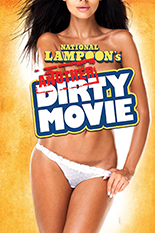 Except for one performer, National Lampoon’s Another Dirty Movie represents a career low for all involved. Considering top-billed Jonathan Silverman starred in
Except for one performer, National Lampoon’s Another Dirty Movie represents a career low for all involved. Considering top-billed Jonathan Silverman starred in 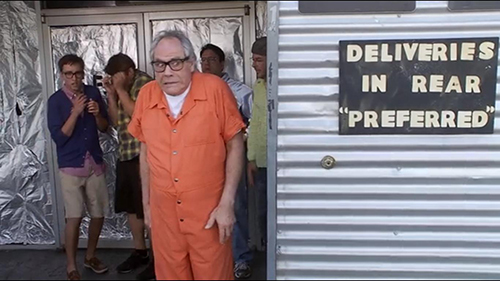

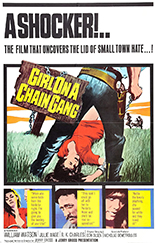 Nearly a decade before
Nearly a decade before 